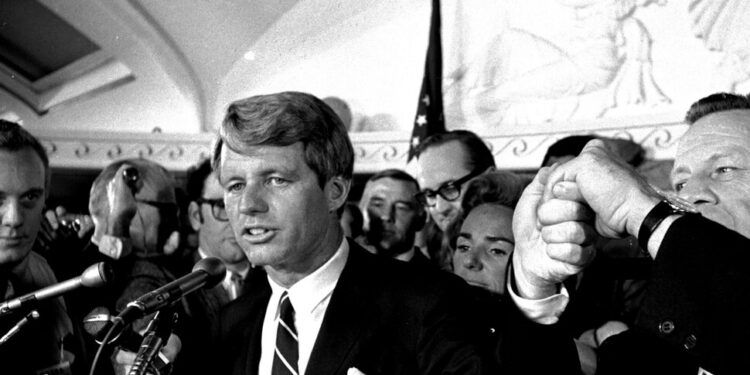Fifty-six years ago today, on 5 June 1968, America was once again plunged into profound grief. Senator Robert F. Kennedy, a vibrant and promising candidate for the Democratic presidential nomination, was fatally shot in Los Angeles. His death, which occurred the following day, extinguished not only a towering political ambition but, for many, a powerful beacon of hope in an incredibly turbulent era.
The evening had started with pure elation. Kennedy had just delivered a triumphant victory speech at the Ambassador Hotel, acknowledging the roaring crowds after winning the critical California Democratic primary. He was on a clear path to securing his party’s nomination, riding a wave of support from a diverse coalition of voters—including minorities and working-class Americans—who saw in him a true champion for social justice and an urgent end to the Vietnam War. With recent wins in Indiana, Nebraska, and now California under his belt, his momentum was undeniable.
But as he exited the ballroom through a kitchen pantry, heading to meet waiting journalists, the unthinkable happened. Sirhan Sirhan, a 24-year-old Palestinian immigrant, opened fire, striking Kennedy multiple times at close range. Chaos erupted in an instant. Kennedy collapsed, critically wounded. Despite immediate efforts and emergency surgery, he succumbed to his injuries about 26 hours later, on 6 June 1968, at Good Samaritan Hospital.
The assassination sent shockwaves across the nation and the world. It was a haunting echo of the tragedy that had claimed his elder brother, President John F. Kennedy, less than five years earlier. For a country already reeling from the assassination of Martin Luther King Jr. just two months prior, and deeply divided by civil rights struggles and the protracted war in Vietnam, Kennedy’s death was a crushing blow. It cemented a pervasive sense of despair and cynicism about the future of American politics.
Robert Kennedy’s campaign had been defined by his passionate pleas for unity and his deep commitment to addressing the nation’s severe social inequalities. He frequently spoke of bridging divides and healing a fractured society. His assassination robbed the Democratic Party, and indeed the entire nation, of a charismatic and compelling voice at a pivotal moment in history.
Sirhan Sirhan was apprehended immediately at the scene and subsequently convicted of Kennedy’s murder. While his motives have been endlessly debated and remain a subject of much speculation, the official narrative states he acted alone, driven by anger over Kennedy’s support for Israel.
The death of Robert F. Kennedy stands as a poignant reminder of a political era marked by intense upheaval and profound loss. His legacy, however, endures. He’s remembered not just for his tragic end, but also for his unwavering dedication to public service, his genuine empathy for the underprivileged, and his vision for a more just and equitable America. His premature exit from the political stage left an indelible mark on the course of American history, forever altering the trajectory of the 1968 presidential election and the hopes of a generation.
newshub finance



Recent Comments